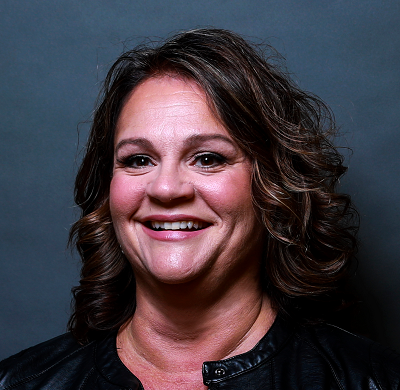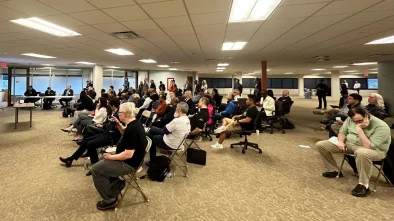Woman-led SciMar ONE is All-In on New Jersey as its Drug Development Offering Evolves
For Donna and Mike Conroy, cofounders of SciMar ONE (Allentown), the opportunities available to them in New Jersey to speed up their startup’s progress have been game changing — due to programs sponsored by the New Jersey Economic Development Authority (NJEDA); BioNJ; and the Merck Digital Sciences Studio (MDSS), at NJIT’s New Jersey Innovation Institute (NJII). Through MDSS the company has received support from Microsoft for Startups and advice and support from three pivotal healthcare investment groups.
Donna is the CEO and Mike is the CTO of their company, which offers an AI-based platform to accelerate drug development. The cofounders are a married couple.
NJTechWeekly.com recently spoke to Donna Conroy about the company. She explained that SciMar has pioneered “Development Velocity,” an artificial intelligence (AI)-based process with a lot of intellectual property (IP) behind it. We’ll have more on Development Velocity later in this article.
How Organizations in New Jersey Helped the Company
Conroy had a lot of good things to say about how the NJEDA has helped her company grow. One of the recent NJEDA programs SciMar participated in was last month’s Founders & Funders event. “We had a lot of follow-up and made a lot of great connections there,” Conroy said.
“In late October 2022, our team attended an NJEDA informational session focused on life science funding and incentives in New Jersey. It was just the right time for our company to engage with the NJEDA. We were thrilled to learn the variety and depth of support offered by the NJEDA; it was here we realized how the state could be a valuable connection and partner for startups like ours,” she added.
“The NJEDA team does outstanding work building and implementing economic-based programs and resources that support and help entrepreneurs build and scale New Jersey-based businesses. Kara Moore, sector lead for life sciences and strategic sector development, is instrumental in helping us grow within the New Jersey ecosystem beyond finance. Kara helps connect and build relationships between pharma, investors and startups to stimulate growth for New Jersey’s pharmaceutical industry.
“Her work is critically important to us as a new woman-owned business. As traditional pharma companies seek to adopt new and innovative ways of doing business, having a trusted source like the NJEDA to make reliable connections in the ecosystem is good for all ─ pharma, investors and vendors alike.”
The cofounders also participated in BioNJ’s BioPartnering Conference, held on April 18 at The Palace at Somerset Park. There they connected with investors for half-hour meetings, and Conroy was able to participate in a pitch competition, where she was asked to give a two-minute elevator pitch.
The cofounders are also about halfway through the program at the Merck Digital Sciences Studio, a 10-month startup accelerator — with direct investments from Merck Global Health Innovation Fund (Rahway), Northpond Ventures (Bethesda, Md.) and McKesson Ventures (San Francisco) — that seeks to enable the next generation of innovative digital technologies for drug discovery and development. And they’ve secured their first partnership through that accelerator.
Accelerating Disease-Specific Drug Development
SciMar is a technology startup with a drug-development road map based on a proprietary disease-specific data platform that allows the pharmaceutical industry to accelerate drug development. It started out in 2003 as a consultancy, and then evolved into a technology solutions company. In 2021, the owners took all the assets of their former companies and rolled them into SciMar, so they could use all the learning they had gained from their earlier companies to create a new company with a new mission in the pharmaceutical industry.
“Development Velocity is the speed that a pharma company moves a drug from Phase Two throughout commercialization. And we have two products that help pharma companies move faster, which we all know is important, right? So, the first one is a DV Index Score. It’s kind of like a FICO score. We go very deep into the pharma company, and we look at three critical pieces of what helps accelerate drugs: data utility, how science is used for decision making; project management, so how they’re actually managing the drug-development program; and those interdependencies of workflow between all of the teams that work together to get this done,” Conroy said.
“And then we analyze the corporate approach,” she continued. “Is this a pharma company that’s very amenable to technology and doing things a little bit differently? If so, they will be doing the same thing, but we will just automate it. We use that DV Index Score to understand where the holes and inefficiencies might be in the system. And then we apply the technology and use direct measurements to ensure that the technology is helping them move faster. And then we go back year after year. What are the next set of bottlenecks that are holding them up? And then we try to solve for those as well, with technology. The keys are workflow automation and data integration.”
SciMar has worked with outside developers, consultants and marketing agencies to achieve its goals. Conroy mentioned “a great New Jersey marketing firm called “BNO,” based in Somerville, that “really helped us shape and form the concept of Development Velocity.”
Mission: Enabling Pharma Companies to Bring out More Drugs and Be More Profitable While Helping Patients
The company’s mission is always top of mind. “We are really focused on not only accelerating drug development. Our mission isn’t just about getting drugs to the patients, which is the number-one part of the mission. But there’s a bigger story at play here in terms of why we’re doing what we’re doing. If we’re able to reduce the costs of bringing the drug to market,” SciMar will enable pharmaceutical companies to bring out more drugs and be more profitable.
“Deloitte came out with a paper that says it now costs $298 million more on average to bring a new drug to market. That number increased from 2021 to 2022, and is continuing to increase. That means the ROI [return on investment] for a pharma company is less. And when that ROI is less, that means they might not be investing as much in research and development for the future. So, you know, it’s all about the patients again. We want more ROI so they can continue to invest these big dollars in new drugs, so that we’re continuing to help patients.”
The conversation ended with a discussion of how valuable Microsoft for Startups has been for SciMar. “That’s been a great relationship. They’ve helped us a lot from the technology side. And in addition to that, we are in their internal program called ‘Pegasus.’ So, they look for the companies that they think will be the next generation of unicorns, and they think we are going to make a real impact in the world. We receive a little bit of white-glove hand holding with that. And they are a great resource for so many reasons.”
Conroy noted that the hot buzzword now is “ChatGPT,” and the company is already certified in that through Microsoft’s programs. “That’s a great relationship to have, as well. I also love the fact that the person who heads up Microsoft for Startups in life sciences is a woman by the name of Sally Frank. And Sally sees things and helps us from the female perspective and from the perspective of women-owned businesses. We are a [also] Microsoft market partner,” she said.
“Dan Langille, who is our acting chief revenue officer, has 25 years of experience in the Microsoft ecosystem. Microsoft is a great co-sell partner, and they have a lot of obviously big relationships with the big pharma companies.” One piece of information about Microsoft that many founders might not know is that they have made a commitment not to compete with their customers or their partners, Conroy told us. “I feel very confident as a small business owner who has a lot of IP. I’m protecting it, obviously, through legal resources. But it is reassuring that they have made commitments never to compete. They’re not entering the healthcare space and saying, ‘Yeah, we’re going to build this out too.’ Instead, they focus on their partnerships, and really supporting what their partners need to do and what we do best, because we’re the experts.”




